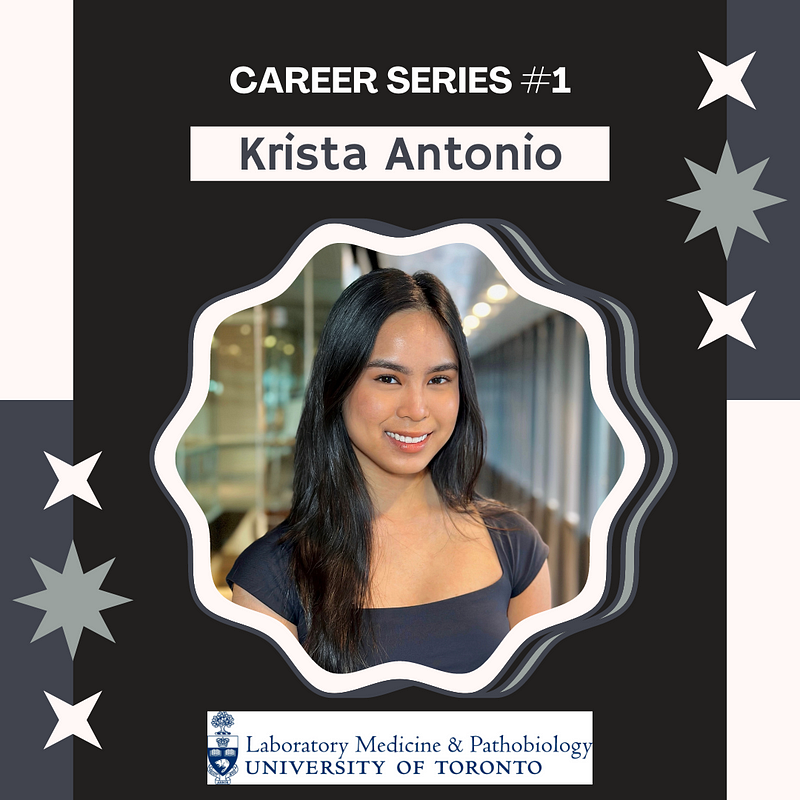Exploring Laboratory Medicine: Insights from a Master's Student
Written on
Chapter 1: Introduction to the Career Series
I am excited to announce a brand new series on my blog, dedicated to exploring various careers within the realm of Science! As someone who studied biology as an undergraduate, I understand the challenges that come with selecting a career path, especially when it comes to connecting with individuals in postgraduate programs. I have always been eager to find answers to the questions that many students, including myself, have about different fields. In the upcoming weeks, I will conduct interviews and write articles highlighting several professions to assist high school and undergraduate students in discovering various career options and pathways.

Photo by Getty Images
For this installment of the Career Series, I had the privilege of interviewing Krista Antonio, a Master's candidate in Laboratory Medicine and Pathobiology at the University of Toronto. Krista completed her undergraduate studies at McMaster University, where she focused on Biochemistry with a minor in Anthropology. I asked her ten questions about her academic journey and motivations for pursuing a master's degree:

When did you decide to pursue a Master's?
“I have always been drawn to science and recognized that obtaining a master's degree would create numerous opportunities. I saw many people on LinkedIn who were in graduate school, and I viewed it as a significant step forward. I also wanted to return to Toronto for my postgraduate studies, which led me to the University of Toronto!”
Did you engage in research, and did it influence your decision to pursue a Master's?
“During my fourth year, I conducted a thesis project on celiac disease, focusing on the recovery of mucosal lesions following a gluten-free diet in a mouse model. This experience taught me a great deal and sparked my interest in the research process, prompting me to continue my studies. I learned that during the interview process, it’s important to evaluate not just if you’re a good fit for the lab, but also if the lab is a good fit for you.”
Were there any extracurricular activities or experiences that helped prepare you for a Master's program?
“Maintaining balance in graduate school is crucial, especially through activities unrelated to science. When experiments don’t succeed, having different outlets for managing mental health is vital. During my undergraduate years, I minored in anthropology and took part in intramural frisbee, as well as led mentorship initiatives.”
What distinguishes your Master's program? Is it course-based or thesis-based?
“Typically, the program lasts between 2 to 3 years, though this can vary. In Laboratory Medicine and Pathobiology, we have two Pass/Fail courses: one lasts half the semester, and the other spans a full semester. The classes often involve faculty and seminar discussions to showcase exciting research within our department.”
Did you contemplate pursuing a Master's in another scientific field, and what led you to your current program?
“I chose Laboratory Medicine and Pathobiology because of a specific principal investigator whose work I was interested in. To join her lab, I needed to be part of this program.”
How would you compare the rigor of graduate studies to undergraduate studies?
“Undergraduate life had its moments of low and high stress, particularly around midterms and exams, which I refer to as acute stress. In contrast, graduate school involves more chronic stress; it's a lower level of stress that persists throughout the year. While there's more flexibility, accountability for your work is key, and it’s more self-directed.”
What advice would you give to high school students aiming for success in undergraduate studies?
“Staying organized is essential. A planner is invaluable for tracking deadlines and prioritizing tasks. For test preparation, I found active recall techniques to be the most effective, using tools like Quizlet flashcards to set personal goals for study sessions.”
What career paths do students in your Master's program typically pursue after graduation?
“Graduates take various routes: some transition to PhD programs, others find positions in industry, and some enter professional schools. Attending career talks and panels can provide insights into where alumni end up after their Master's.”
What are the most challenging and rewarding aspects of being a Master's student?
“One of the biggest challenges is self-motivation and accountability. However, the most rewarding moments include witnessing your research come together, networking, and the opportunity to travel for conferences or training, like my recent trip to Vancouver to learn a new lab technique.”
What final thoughts would you share with a student considering a similar path?
“I encourage you to actively seek out opportunities, discuss potential projects with your PI, and embrace the chances you receive! It’s a significant commitment, but remember, it isn’t your entire life, and there’s always light at the end of the tunnel. Research can be demanding, but it’s also incredibly fulfilling!”
I hope this piece has shed light on the experience of being a Master's student. A heartfelt thank you to Krista for sharing her insights and participating in this series.
For any suggestions or requests regarding future careers or fields to explore, please feel free to reach out!
We’re dedicated to empowering the next generation of thinkers, innovators, and learners to express their ideas and creativity through writing. Our community encompasses a wide range of topics—from Growth and Technology to Future trends and Global issues.
So, if you’re ready to dive into an enriching array of articles, join us on this exciting journey!
students x students
Chapter 2: Career Insights from a Medical Laboratory Scientist
This video features an interview with a Medical Laboratory Scientist discussing their career journey and the realities of the profession.
Chapter 3: Meaningful Work in Laboratory Science
In this video, a Medical Laboratory Scientist shares insights about meaningful work, career growth, and the impact of their role in healthcare.